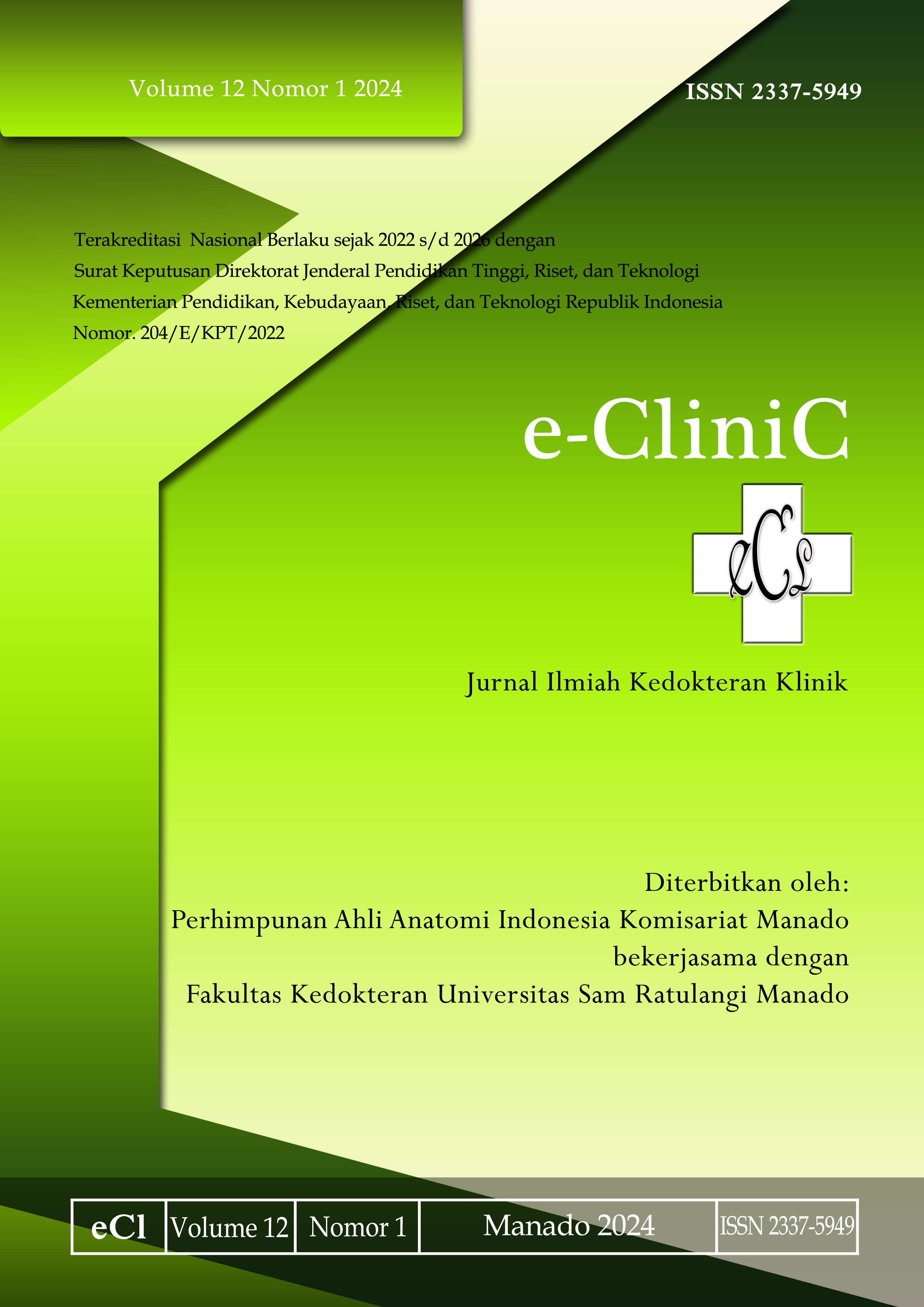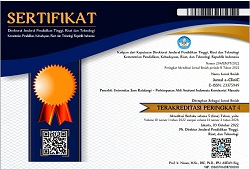Pengaruh Evolocumab terhadap Pasien Dislipidemia dengan Intoleransi Statin
DOI:
https://doi.org/10.35790/ecl.v12i1.45494Abstract
Abstract: Statins, lipid-lowering drugs, are used to reduce low density lipoprotein cholesterol (LDL-C). Although statins are well tolerated by most people, their side effects e. g. myopathy and statin intolerance have impacts on dose reduction and therapy discontinuation. Evolocumab is considered in patients with statin intolerance. This study aimed to determine the effect of evolocumab on LDL-C levels in patients with dyslipidemia and statin intolerance. This was a literature review study using literature search on three databases, namely PubMed, ClinicalKey, and ScienceDirect with the keywords Dyslipidemia AND Evolocumab AND Statin Intolerance. The results obtained seven related literatures. In general, evolocumab therapy was safe and effective in reducing LDL-C levels for patients who needed drugs to lower LDL-C. Based on the literatures, inhibition of PCSK9 activity on evolocumab had an effect on reducing LDL-C levels by 50-70%. This therapy could reduce the risk of cardiovascular diseases such as the ratio of Apo B/Apo A1, triglycerides, and total cholesterol. In conclusion, evolocumab therapy is generally safe and effective in significantly reducing LDL-C. Adverse effects caused by the therapy tend to be mild.
Keywords: dyslipidemia; low density lipoprotein cholesterol; statins; statin intolerance; evolocumab
Abstrak: Statin merupakan obat penurun lipid untuk menurunkan kolesterol low density lipoprotein (K-LDL) dan umumnya dapat ditoleransi dengan baik namun miopati dan efek samping lainnya serta intoleransi statin dapat mengarah ke penurunan dosis atau penghentian terapi. Pemberian evolocumab dapat dipertimbangkan pada keadaan intoleransi statin. Penelitian ini bertujuan untuk mengetahui pengaruh evolocumab terhadap kadar K-LDL pasien dengan dislipidemia dan intoleransi statin melalui suatu literature review. Pencarian literatur pada tiga database, yaitu PubMed, ClinicalKey, dan ScienceDirect dengan kata kunci Dyslipidemia AND Evolocumab AND Statin Intolerance. Hasil penelitian mendapatkan tujuh literatur untuk dikaji. Berdasarkan kajian literatur didapatkan terapi evolocumab umumnya aman dan efektif dalam menurunkan kadar K-LDL bagi pasien yang membutuhkan obat untuk penurunan kolesterol. yang telah didapat. Penghambatan aktivitas PCSK9 pada evolocumab berpengaruh dalam menurunkan kadar K-LDL sekitar 50-70%. Terapi tersebut dapat mengurangi risiko penyakit kardiovaskular seperti rasio Apo B/Apo A1, trigliserida, dan kolesterol total. Simpulan penelitian ini ialah terapi evolocumab umumnya aman dan efektif dalam menurunkan kadar K-LDL secara bermakna. Kejadian yang tidak diinginkan yang ditimbulkan oleh terapi cenderung ringan.
Kata kunci: dislipidemia; kolesterol low density lipoprotein; statin; intoleransi statin; evolocumab
References
Pappan N, Rehman A. Dyslipidemia. [Updated 2022 Jul 11]. In: StatPearls [Internet]. Treasure Island (FL): StatPearls Publishing; 2022 Jan-. Available from: https://www.ncbi.nlm.nih.gov/books/NBK560891/
Puspaseruni K. Tatalaksana dislipidemia terkait penyakit kardiovaskular aterosklerosis (ASCVD): fokus pada penurunan LDL-C. CDK edisi CME-4. 2021;48(10):395-401.
Perkeni. Panduan pengelolaan dislipidemia di Indonesia 2021 (1st ed). PB Perkeni; 2021. p. 1–2.
Erwinanto, Santoso A, Putranto JNE, Tedjasukmana P, Sukmawan R, Suryawan R, et al. Panduan tata laksana dislipidemia 2017. Jakarta: Perhimpunan Dokter Spesialis Kardiovaskular Indonesia; 2017.
Laporan Rikerdas Nasional 2018. Kementerian Kesehatan RI. Jakarta: Badan Penelitian dan Pengembangan Kesehatan; 2018
WHO. Mean Total Cholesterol (crude estimate). [Internet] World Health Organisation. 2021. Available from: https://www.who.int/data/gho/indicator-metadata-registry/imr-details/2384
Liu T, Zhao D, Qi Y. Global trends in the epidemiology and management of dyslipidemia. J Clin Med. 2022;11(21): 6377. Available from: https://doi.org/10.3390/jcm11216377.
Zeitouni M, Sabouret P, Kerneis M, Silvain J, Collet JP, Bruckert E, et al. 2019 ESC/EAS Guidelines for management of dyslipidaemia: strengths and limitations. Eur Hear J - Cardiovasc Pharmacother. 2021;7(4):324–33. Doi: 10.1093/ehjcvp/pvaa077.
Alonso R, Cuevas A, Cafferata A. Diagnosis and management of statin intolerance. J Atheroscler Thromb. 2019;26(3):207-15. Doi: 10.5551/jat.RV17030.
Cheeley MK, Saseen J, Agarwala A, Racilla S, Ciffone N, Jacobson TA, et al. NLA scientific statement on statin intolerance: a new definition and key considerations for ASCVD risk reduction in the statin intolerant patient. Journal of Clinical Lipidology. 2022;16(4):361-75. Doi: 10.1016/j.jacl.2022.05.068.
Bytyci I, Penson P, Mikhailidis DP, Wong ND, Hernandez AV, Sahebkar A, et al. Prevalence of statin intilerance: a meta-analisys. Eur Heart J. 2022;43(34): 3213-23. Doi: 10.1093/eurheartj/ehac015.
Gaine SP, Kulkarni S, Dixon DL, Patel J. NLA 2022 Definition of Statin Intolerance. [Internet] American College of Cardiology 2022. Available from: https://www.acc.org/Latest-in-Cardiology/Articles/ 2022/08/08/12/27/NLA-2022-Definition-of-Statin-Intolerance
Kasichayanula S, Grover A,. Emery MG, Gibbs MA, Somaratne R, Wasserman SM, et al. Clinical pharmacokinetics and pharmacodynamics of evolocumab, a PCSK9 inhibitor. Clin Pharmacokinet. 2018;57:769–79. Doi: 10.1007/s40262-017-0620-7.
Nissen SE, Stroes E, Dent-Acosta RE, Rosenson RS, Lehman SJ, Sattar N, et al. Efficacy and tolerability of evolocumab vs ezetimibe in patients with muscle-related statin intolerance: The GAUSS-3 randomized clinical trial. JAMA. 2016;315(15):1580-90. Doi: 10.1001/jama.2016.3608.
Stroes E, Colquhoun D, Sullivan D, Civeira F, Rosenson RS, Watts GF, et al. Anti-PCSK9 antibody effectively lowers cholesterol in patients with statin intolerance: the GAUSS-2 randomized, placebo-controlled phase 3 clinical trial of evolocumab. J Am Coll Cardiol. 2014;63(23):2541-8. Doi: 10.1016/j.jacc.2014.03.019.
Nissen SE, Dent-Acosta RE, Rosenson RS, Stroes E, Sattar N, et al. Comparison of PCSK9 inhibitor evolocumab vs ezetimibe in statin-intolerant patients: design of the goal achievement after utilizing an anti-PCSK9 antibody in statin-intolerant subjects 3 (GAUSS-3) trial. Clin Cardiol. 2016;39(3):137-44. Doi: 10.1002/clc.22518.
Sullivan D, Olsson AG, Scott R, Kim JB, Xue A, Gebski V, et al. Effect of a monoclonal antibody to PCSK9 on low-density lipoprotein cholesterol levels in statin-intolerant patients: the GAUSS randomized trial. JAMA. 2012;308(23):2497-506. Doi: 10.1001/jama.2012.25790.
Koba S, Inoue I, Cyrille M, Lu C, Inomata H, Shimauchi J, Kajinami K. Evolocumab vs. ezetimibe in statin-intolerant hyperlipidemic japanese patients: phase 3 GAUSS-4 trial. J Atheroscler Thromb. 2020;27(5):471-84. Doi: 10.5551/jat.50963.
McCollum JC, Claru JM, Guglin ME, Rao RA. Utilization of PCSK-9 inhibitors in statin intolerant cardiac transplant patients. J Card Fail. 2020;26(10):S106-7.
Oren O, Kludtke EL, Kopecky SL. Characteristics and outcomes of patients treated with proprotein convertase subtilisin/kexin type 9 inhibitors (The Mayo Clinic Experience). Am J Cardiol. 2019;124(11):1669-73. Doi: 10.1016/j.amjcard.2019.08.016.
McDonagh M, Peterson K, Holzhammer B, Fazio S. A systematic review of PCSK9 inhibitors alirocumab and evolocumab. J Manag Care Spec Pharm. 2016;22(6):641-53q. Doi: 10.18553/jmcp.2016.22.6.641.
Peng W, Qiang F, Peng W, Qian Z, Ke Z, Yi L, et al.Therapeutic efficacy of PCSK9 monoclonal antibodies in stain-nonresponsive patients with hypercholesterolemia and dyslipidemia: A systematic review and meta-analysis. Int J Cardiol. 2016;222:119-29. Doi: 10.1016/j.ijcard.2016.07.239.
Orringer CE, Jacobson TA, Saseen JJ, Brown AS, Gotto AM, Ross JL, et al. Update on the use of PCSK9 inhibitors in adults: recommendations from an expert panel of the National Lipid Association. Journal of Clinical Lipidology. 2017;11(4):880-90. Doi: 10.1016/j.jacl.2017.05.001.
Indrayathi PA. Economic Evaluation In Health Care. Denpasar: Universitas Udayana; 2016
Lima AO, Ballester VG, Sanchez JF,Hoces AM, Gonzalez-Outon J, Rey EJ. Cost-effectiveness and budget impact of treatment with evolocumab versus statins and ezetimibe for hypercholesterolemia in Spain. Spanish Journal of Cardiology 2018;71(12):1027-35
Alghamdi A, Balkhi B, Altowaijri A, Al-shehri N, Ralph L, Marriot E, et al. Cost-effectiveness analysis of treatment of dyslipidemia in the Kingdom of Saudi Arabia. Pharmacoecon Open. 2022;6(2):277-91. Doi: 10.1016/j.rec.2018.05.003.
Gandra SR, Villa G, Fonarow GC, Lothgren M, Lindgren P, Somaratne R, et al. Cost-effectiveness of LDL-C lowering with evolocumab in patients with high cardiovascular risk in the United Stated. Clinical Cardiology. 2016;39(6):313-20. Doi: 10.1002/clc.22535.
Downloads
Published
How to Cite
Issue
Section
License
Copyright (c) 2023 Kristiani A. Laluyan, Edward Nangoy, Jimmy Posangi

This work is licensed under a Creative Commons Attribution-NonCommercial 4.0 International License.
COPYRIGHT
Authors who publish with this journal agree to the following terms:
Authors hold their copyright and grant this journal the privilege of first publication, with the work simultaneously licensed under a Creative Commons Attribution License that permits others to impart the work with an acknowledgment of the work's origin and initial publication by this journal.
Authors can enter into separate or additional contractual arrangements for the non-exclusive distribution of the journal's published version of the work (for example, post it to an institutional repository or publish it in a book), with an acknowledgment of its underlying publication in this journal.
Authors are permitted and encouraged to post their work online (for example, in institutional repositories or on their website) as it can lead to productive exchanges, as well as earlier and greater citation of the published work (See The Effect of Open Access).







